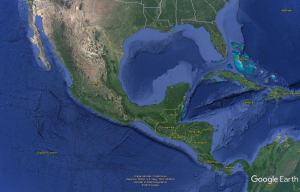Mexico and Central America Airborne Lidar Collection Campaign for Small- and Medium-Sized Projects
The National Center for Airborne Laser Mapping (NCALM) is announcing a call for expressions of interest from researchers with small- to medium-sized projects and budgets in Mexico and Central America for Spring 2019 (March–May), including but not limited to archaeology, geology, and ecology. In the past two years, NCALM has received several inquiries from individual researchers with small projects in Mexico and Central America. The size of these projects, and their associated budgets, make them economically and practically unfeasible if considered individually. However, if several small projects within a given country or region are grouped together, in such a way that the mobilization costs can be proportionately distributed among the multiple projects, we believe it is possible to survey the small projects and bring large benefits to the broader community.
Currently, NCALM has received expressions of interest for small areas in central and south Belize, the Campeche/Tabasco/Chiapas, Mexico, border with Peten, Guatemala, near San Salvador, El Salvador, and the Caribbean coast of Honduras. We are looking for additional projects to complement these sites. The smallest individual project budget that NCALM will consider is $10,000 (USD), which can potentially yield data collections of 10 km2, depending on collection density, distance to airports, and other neighboring projects. The exact coverage will be determined based on analysis of the these and other factors. If you have interest in participating in a community collection campaign, please send a short description of your project, including potential budget and a KMZ with an outline of your area(s) of interest. (The size and shape will be iteratively refined jointly after adjusting for budget, research objectives, and neighboring projects.)
Please contact us if you require more information about this community campaign, and please forward this announcement to other researchers that may have an interest in such data collection. The more projects we can organize together, the larger the areas we will be able to collect for individual projects. NCALM aims to begin data collection in March–May 2019. We will begin requesting permits to fly and collect data for the respective countries near the end of 2018.
For more information, contact NCALM Director Ramesh L. Shrestha at rshrest2 [at] central.uh.edu (subject: Mexico%20and%20Central%20America%20Lidar%20Campaign) (rshrest2[at]central[dot]uh[dot]edu) (budgets) and Juan Carlos Fernandez Diaz at jfernan4 [at] central.uh.edu (subject: Mexico%20and%20Central%20America%20Lidar%20Campaign) (jfernan4[at]central[dot]uh[dot]edu) (scheduling, logistics, permitting).
Clarifying notes:
- NCALM is not providing the budget or funds to perform mapping, but rather organizing a campaign to optimize the funds researchers currently have, or can obtain, for their small- or medium-sized projects.
- If you are interested in pursuing cooperative work, please send NCALM a response that includes a KMZ(s) of your study area, a one-to-two paragraph description of you research objectives, and a budget of your potentially available funds. NCALM will work with PIs to develop a plan to allow data collection in their focus area(s).
- Additionally, please provide NCALM with information regarding contacts that you have in the foreign country (and locale) of interest and current work permits that you have obtained. Depending on the country, NCALM is required to have varying permits to perform flights or work in specific areas.
Deadlines:
- NCALM is requesting a preliminary commitment by Friday, November 2, 2018, so we can begin the paperwork and preparation of export licenses and permits to the various countries.
- A final commitment and confirmation of funds will be requested by Friday, March 1, 2019, so the mapping campaign can be executed during March–May 2019.


